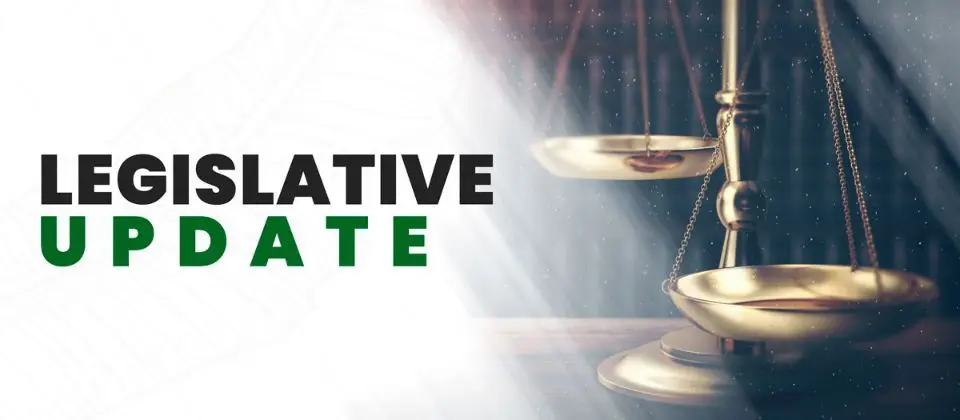
Legislative Update Report #2
by Michael Rainey, President/Executive Director on February 28, 20232023 Legislative Session Mid-Point
With the beginning of week 8 of the 2023 legislative session, we have almost reached the midway point of the 105-day long session. Amongst the hundreds of bills introduced, the approaching legislative deadlines for passing out of committee mean that some will get over the hurdle, some won't, and some face spirited debate. Here are a few updates on the bills that we have been supporting. Please use the legislator contact information on this sheet to contact your elected legislators and ask them to support these bills.HB 1200 Requiring Public Employers to Provide Employee Information to Exclusive Bargaining Representatives
Unions have a duty of fair representation to all employees in a bargaining unit. But public employers do not provide new employee information consistently, timely, or accurately. For designated representatives, keeping up with many employees in large workgroups is challenging because employees have many different work sites and change their contact information. This bill will require employers to provide contact information regularly.- This bill will require employers to provide contact information regularly by creating a clear minimum standard and format.
- Requires certain public employers (K-12, CTC's, 4-year regionals, city, and county) to provide the exclusive bargaining unit with information it has in its records for employees in bargaining units, such as:
- contact information,
- date of hire,
- salary, and
- job site location
- Oregon has a similar law.
HB 1200 has been moving through the process quickly and was referred to the House rules committee for a second review on January 31. Not surprisingly, the most prominent opponent of this legislation is the Freedom Foundation. Nevertheless, we believe it may come to the House floor for a vote this week.
HB 1187 Concerning Privileged Communication Between Employees and the Unions That Represent Them
Union representatives have a responsibility to represent union members. They need complete information about situations from union members to determine whether to bring a grievance forward. Based on a recent court case, union members and representatives fear that those conversations will be used against them by their employers and can be required to be available through discovery. Before 2021 judges did not honor subpoenas about private conversations between union members and representatives. Since 2021, union records have been subpoenaed, and individuals have faced discrimination and retaliation. If employees are not confident that conversations will remain confidential, we will lose an essential part of union representation. Conversations between workers should not be weaponized against union employees, and we are supporting HB 1187 to avoid this happening to any other union members.This bill establishes the legal right of privacy for union communications by creating an exception from examination and disclosure for communication between a union representative and a union employee during union representation.
Without the protections for these communications, the recent case could have a chilling effect on members bringing issues to their union.
HB 1187 has been moving through the process quickly and was referred to the House rules committee for a second review on February 14. We believe it may come to the House floor for a vote this week.
HB 1533 Exempting the Disclosure of Certain Information of Agency Employees or Their Dependents Who are Survivors of Domestic Violence, Sexual Assault, Harassment or Stalking
Many domestic violence survivors spend most of their day at work and need avenues to protect them when they are there. Many also cannot maintain jobs because it makes them vulnerable to being found by their abusers. This act would help keep survivors safe at work and make employment more accessible. The current practice of going to court for an injunction to stop releasing a person's information is too lengthy, time-consuming, and expensive if you need a lawyer. A case currently on appeal to the Washington Supreme Court might make it necessary for employees seeking the protection of their work information to request an injunction on an individual case-by-case basis under the current law, which would be an inefficient way to protect workers.The bill seeks to exempt the personally identifying information of certain agency employees (or their dependents) who are survivors of domestic violence, sexual assault, harassment, or stalking from disclosure under the Public Records Act. Information including birthdate, job title, addresses of work locations, work email address, work phone number, or bargaining unit, is exempt from disclosure under the PRA
HB 1533 has been moving through the process quickly and was referred to the House rules committee for a second review on February 14. We believe it may come to the House floor for a vote this week
Other Bills of Interest
SB 5417-Protecting the rights of workers to refrain from attending meetings or listening to their employer's speech on political or religious matters. "Political matters" means matters relating to elections for political office, political parties, proposals to change legislation, proposals to change regulation, and the decision to join or support any political party or political, civic, community, fraternal, or labor organization. This bill received a second reading by the rules committee on February 14.HB 1540-Requiring driver training curriculum to include instruction on sharing the road with large vehicles, including commercial motor vehicles and buses. This bill would require an update to the driver training curriculum in Washington state to include instruction on sharing the road with large vehicles, including commercial motor vehicles and buses. Placed on second reading suspension calendar by Rules Committee. February 22.
SB 5328-Concerning public safety employees' retirement plan membership for public safety telecommunications. Makes certain public safety telecommunicators eligible for membership in the Public Safety Employees Retirement System. This bill would make individuals who are members of the PERS Plans 2 and 3, whose primary responsibility is to respond and process 911 emergency calls for law enforcement, fire, medical, or other public safety services, eligible to participate in PSERS. Passed to Rules Committee for second reading February 9.
HB1491-Prohibiting unjustified employer searches of employee personal vehicles. Prohibit employers from searching for an employee's vehicle in the employer's parking areas. Provides for employee possession of personal property in their vehicle unless the law prohibits it. HB 1491 provides for investigations and potential civil penalties against the employer by the Department of Labor and Industries for violations. Referred to Rules for second Review February 24.
HB 1057-Providing a benefit increase to certain retirees of the public employees' retirement system Plan 1 and the teachers' retirement system Plan 1. Provides a one-time, 3 percent increase to the retirement benefits of retirees in the Public Employees' Retirement System and the Teachers' Retirement System Plan 1, up to $110 per month. Directs the Select Committee on Pension Policy to study and recommend an ongoing cost-of-living adjustment during the 2023-2025 fiscal biennium. Referred to Rules for second Review February 24.

